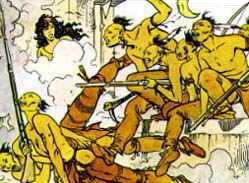 Another Stereotype of the Month entry:
Another Stereotype of the Month entry:
 Another Stereotype of the Month entry:
Another Stereotype of the Month entry:
Posted: April 09, 2003 -- 10:18am EST
"On Monday, March 24, Christian Broadcasting Network's news program CBN reporter Paul Strand, traveling with the Army's Third Infantry Division in Iraq, stated in a dialog with Pat Robertson:
"Everywhere we've gone we have seen artillery ahead of us and then artillery behind and we're getting reports that there's fighting in all of the cities that we've already been through. So I guess if this were the Old West I'd say there are Injuns ahead of us, Injuns behind us, and Injuns on both sides too, so we really don't want to give the enemy any hints about where we are."
Rhino's blog properly titled the piece, "Racist Quote of the Week." Certainly it is offensive. "Injun" is a pretty antiquated and always demeaning way to refer to tribal peoples of North America. Perhaps it is racist as well. But the sense of the quote -- how it fixes the historical position of the people Strand refers to as "Injuns" is worth pondering. "Injuns" were (are) the ones belonging to the place being invaded, killed. They were (are) to be defeated, overcome. Native American Vietnam veterans will often recall the use of the term, "Indian country," by American troops when referring to "enemy" territory during that difficult war that saw so many young people die in a far away land.
Arguably, Strand's idea of American Indians is shared by a large piece of the American public. There is even a basis of truth in this way of viewing history. Indian nations were in fact invaded -- though not ultimately conquered. They received onto their ancestral lands new populations, many of whom endorsed and carried out tactics of annihilation. The Indians were the enemy of the settlers, but they also, amazingly, survived the settlers, became neighbors to the settlers. As outright annihilation failed as a "final solution," tactics of dispossession followed. The Native tribes sustained huge losses of assets as new states entered the American Union. Often those new state governments assisted the imposed taking of Native lands by new settlers -- by right of military might, by right of new and emerging, though always contested, law. Nevertheless, the tribes have survived.
Related links
Savage Indians
|
. . . |

|
All material © copyright its original owners, except where noted.
Original text and pictures © copyright 2007 by Robert Schmidt.
Copyrighted material is posted under the Fair Use provision of the Copyright Act,
which allows copying for nonprofit educational uses including criticism and commentary.
Comments sent to the publisher become the property of Blue Corn Comics
and may be used in other postings without permission.